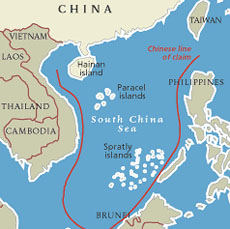Territorial Disputes in the South China Sea: What are the Risks of Conflict?

Informations pratiques
Centres et programmes liés
Ceci est un événement réservé.
En savoir plus sur nos programmes de soutienSéminaire autour de Ralf Emmers, professeur associé et coordinateur du Programme sur le multilatéralisme et le régionalisme à la S. Rajaratnam School of International Studies (RSIS) de Singapour. Parmi ses derniers ouvrages figurent : Geopolitics and Maritime Territorial Disputes in East Asia, London: Routledge, 2009. (with Sam Bateman) (eds), Security and International Politics in the South China Sea: Towards a Co-operative Management Regime, London: Routledge, 2009.
Présidence: Françoise Nicolas, directeur, Centre Asie Ifri.
Le séminaire se tiendra en anglais.
The presentation will focus on the changing distribution of power in the South China Sea and assess the implications this has for conflict management and avoidance in the disputed areas. There is a growing asymmetry of naval power in the South China Sea to the advantage of China. Southeast Asian claimants are concerned about the rapidly changing power distribution and fear that overwhelming naval capabilities could one day be used by the People's Republic of China to resolve the sovereignty question militarily. The presentation will therefore examine how the Southeast Asian nations have sought, with some success, to manage the unequal power distribution in the South China Sea through the activities of the Association of Southeast Asian Nations (ASEAN) and its model of conflict management and avoidance. It will assess the risks of conflict in the short to medium term and offer a way forward.
Intervenants
Autres événements

Chaînes d’approvisionnement des véhicules électriques au Japon et en Europe : quels défis ?
La sécurité économique vise à garantir la résilience des chaines approvisionnements des industries clés : le cas des productions de véhicules électriques au Japon et en Europe sera discuté.

Quelle politique de défense en Allemagne ?
Face à la guerre en Ukraine et à l’instabilité géopolitique en Europe dans un cadre transatlantique perturbé, l’Allemagne a amorcé un tournant majeur dans sa politique de défense, avec une hausse significative des dépenses militaires, la modernisation de la Bundeswehr et le débat sur un éventuel retour du service militaire obligatoire.

Quel partenariat technologique avec l’Inde ?
Le 16ème Sommet UE-Inde, qui s’est tenu le 27 janvier à New Delhi en présence des dirigeants européens António Costa, Ursula von der Leyen, et du Premier ministre Narendra Modi, marque un tournant dans le renforcement des liens entre l'Union européenne et l'Inde. Parallèlement, les visites bilatérales se multiplient, à l’image de celle du Président français qui s’est rendu en Inde mi-février pour participer au Sommet sur l’Intelligence Artificielle.








